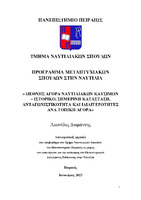Διεθνής αγορά ναυτιλιακών καυσίμων – Ιστορικό, σημερινή κατάσταση, ανταγωνιστικότητα και ιδιαιτερότητες ανά τοπική αγορά

Προβολή/
Λέξεις κλειδιά
Απανθρακοποίηση ; Ναυτιλία ; Ναυτιλιακά καύσιμα ; Εναλλακτικά καύσιμα ; Decarbonization ; Shipping ; Alternative fuelsΠερίληψη
Σκοπός της παρούσας εργασίας είναι η εξέταση και η ανάλυση των υπαρχόντων και μελλοντικών λύσεων όσον αφορά στα εναλλακτικά καύσιμα και τις τεχνολογίες και πρακτικές μείωσης των ρύπων που μπορούν να χρησιμοποιηθούν στη ναυτιλία.
Τα εναλλακτικά καύσιμα που εξετάστηκαν είναι το υδρογόνο, η αμμωνία , η μεθανόλη, η οικογένεια των βιοκαυσίμων και η πυρηνική ενέργεια. Οι τεχνολογίες που εξετάστηκαν για τις πρακτικές μείωσης των ρύπων είναι οι πλυντηρίδες καυσίμων(scrubbers) και η μείωση της ταχύτητας(slow steaming).
Οι λύσεις που εξετάστηκαν φέρουν τα εναλλακτικά καύσιμα και τις τεχνολογίες μείωσης των ρύπων είτε απευθείας στο σύστημα πρόωσης του πλοίου ( ως κύρια ή επικουρική πηγή ενέργειας) είτε ως παροχή ενέργειας για τα βοηθητικά συστήματα του πλοίου.
Οι λύσεις για το μέλλον της ναυτιλίας είναι πολυάριθμες ,η καθεμία με τα πλεονεκτήματα και τα μειονεκτήματα της.
Συνεπώς, δεν υπάρχει μια και μοναδική λύση η οποία να ταιριάζει σε όλες τις περιπτώσεις απανθρακοποίησης του ναυτιλιακού τομέα, αλλά διαφορετικές οι οποίες μπορούν να εφαρμοστούν κατά περίπτωση, ανάλογα με το κόστος υλοποίησης, την δυναμική τους για το μέλλον αλλά και τα προβλήματα που προκύπτουν κατά την υλοποίηση τους.
Ρυθμιστικές αρχές όπως ο Διεθνής Ναυτιλιακός Οργανισμός (ΙΜΟ) και η Ευρωπαϊκή Ένωση μετατρέπουν τους στόχους σε κανονισμούς. Καθώς οι υποχρεωτικοί κανονισμοί για το διοξείδιο του άνθρακα (CO2) ενισχύονται, είναι σαφές ότι κανένα καύσιμο δεν θα λύσει όλες τις ανάγκες της ναυτιλίας για μηδενικές εκπομπές διοξειδίου του άνθρακα. Στο μέλλον, οι πλοιοκτήτες θα εξοπλίσουν τα πλοία για το καύσιμο που είναι το πλέον κατάλληλο για τον τύπο του πλοίου, τη διαδρομή και το φορτίο. Εκτός από την αμμωνία, άλλα υποψήφια εναλλακτικά καύσιμα είναι το υδρογόνο, η μεθανόλη, τα βιοκαύσιμα, και η πυρηνική ενέργεια.

